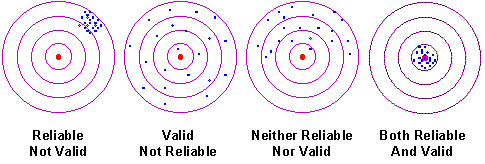Types of Validity
The concept of
validity applies to both whole studies (often called inference validity)
and the measurement of individual variables (often called construct
validity).

Detailed examination of each kind of validity
A related topic is reliability. Some people argue that
reliability is a necessary but not sufficient component of validity.
That is, if a measurement is valid, then it is also reliable. But just
because it is reliability doesn't mean it is valid. Others argue that
the concepts are orthogonal to each other, as in the following table.
| |
Valid |
Not
Valid |
|
Reliable |
You are measuring what you think you are
measuring, and doing it reliably |
You have a reliable measure of something, but
it is biased or not measuring what you thought it was |
|
Not-Reliable |
The average measurement is right on, but each
individual measurement has so much error in it that it is
unusable by itself |
Each time you measure you get something
different, and the average measurement is way off |
The graphic below portrays the same idea.
 |
